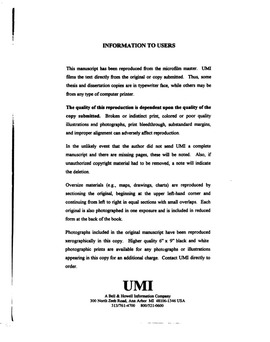| dc.contributor.advisor | Tan, David, | en_US |
| dc.contributor.author | Ryan, Ronald Raymond. | en_US |
| dc.date.accessioned | 2013-08-16T12:29:56Z | |
| dc.date.available | 2013-08-16T12:29:56Z | |
| dc.date.issued | 1997 | en_US |
| dc.identifier.uri | https://hdl.handle.net/11244/5583 | |
| dc.description.abstract | All factors were deemed to be significant at the.05 level using Chi-Square and Discriminant analysis. The most significant motivation factors were that the donor valued higher education, the donor was satisfied with their college experience, and a belief that the university provided a quality education. Significant donor characteristics were that older donors were more likely to give larger gifts and donors with higher income and net worth gave larger gifts. Income tax considerations and the donor's name or loved one's name were significant in discriminating between large and small gifts. | en_US |
| dc.description.abstract | Recommendations for further study include expanding the study to several universities to examine the factors that are significant for different types of gifts. The quality of the academic institution could also be examined relative to the types of gifts. | en_US |
| dc.description.abstract | An unexpected outcome of the research was the relatively low number of non-cash gifts. It would be very useful to expand this study to several universities to create a larger donor base to study factors that determine these different types of gifts. The quality of the institution was rated as very important by the donors in their decision to give. | en_US |
| dc.description.abstract | The instrument used in the study was based on a search of the literature, primarily from resource theory, marketing theory, and Silberg's Philanthropic Chain of Response Model. A panel of individuals who had fund raising responsibilities reviewed the instrument. A total of 347 donors participated in the study out of 1,000 questionnaires for a response rate of 34.7%. There were several donor motivations and characteristics that were significant. | en_US |
| dc.description.abstract | This research used Chi-Square analysis to find the relationships of donor motivation and donor characteristics. Discriminant analysis was also used to differentiate factors pertaining to the size of gift. The subjects in this research were donors who had given to Emporia State University, a mid-sized university in Emporia, Kansas. | en_US |
| dc.format.extent | ix, 118 leaves ; | en_US |
| dc.subject | Education, Finance. | en_US |
| dc.subject | Educational fund raising. | en_US |
| dc.subject | Psychology, Social. | en_US |
| dc.subject | Philanthropists. | en_US |
| dc.subject | Universities and colleges Finance. | en_US |
| dc.subject | Business Administration, Marketing. | en_US |
| dc.title | Impact of donor motivations and characteristics on giving to higher education. | en_US |
| dc.type | Thesis | en_US |
| dc.thesis.degree | Ph.D. | en_US |
| dc.thesis.degreeDiscipline | Department of Educational Leadership and Policy Studies | en_US |
| dc.note | Major Professor: David Tan. | en_US |
| dc.note | Source: Dissertation Abstracts International, Volume: 58-12, Section: A, page: 4563. | en_US |
| ou.identifier | (UMI)AAI9817715 | en_US |
| ou.group | Jeannine Rainbolt College of Education::Department of Educational Leadership and Policy Studies | |
